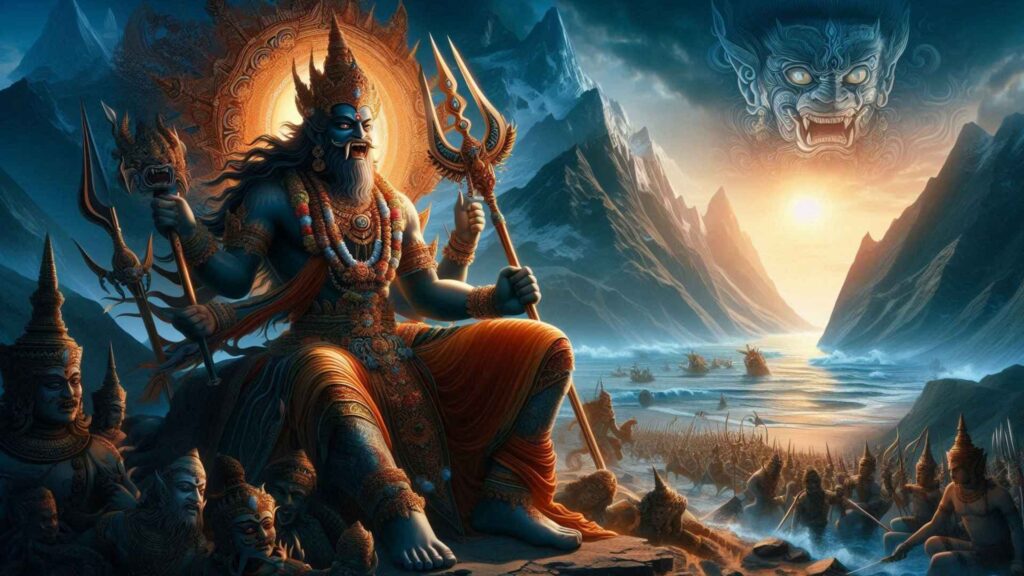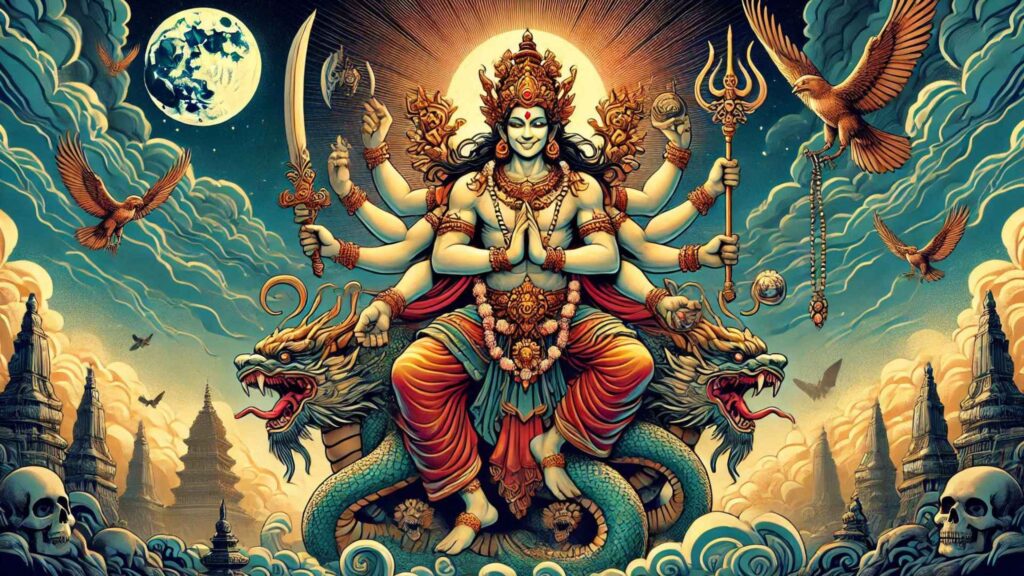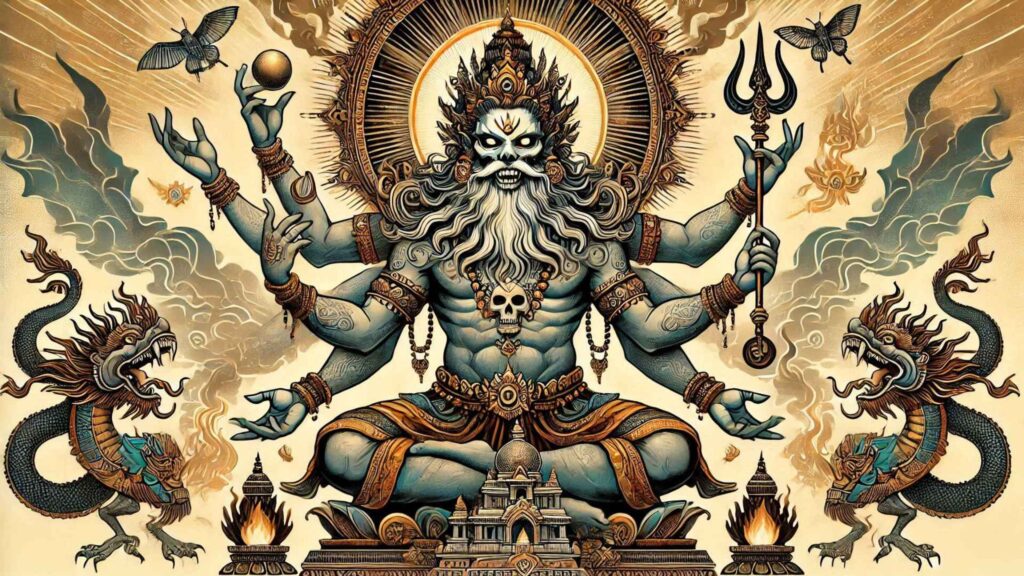Yama: The God of Death and Justice in Hinduism
Introduction
Brief Overview of Yama in Hinduism
Yama, the Hindu god of death, is revered as the deity who governs the afterlife and ensures the righteous dispensation of justice. Known as Dharma Raja (King of Righteousness), Yama plays a crucial role in guiding souls to their rightful destinations based on their karma. He is often depicted as a fair and impartial judge, upholding the moral fabric of the universe.
Read More About Deities And Gods
Significance of Yama in Daily Hindu Life
Yama reminds Hindus of the inevitability of death and the importance of living a righteous life. His presence serves as a moral compass, urging individuals to align their actions with dharma (righteousness). Rituals and prayers invoking Yama are performed to seek protection from untimely death and to ensure peace for departed souls.
Cosmic and Spiritual Importance
Yama’s role extends beyond the physical realm, embodying the principles of karma and cosmic justice. He is seen as a guide for souls transitioning from earthly existence to the afterlife, reinforcing the cycle of life, death, and rebirth.
Names and Etymology

Meaning of Yama
The name “Yama” is derived from the Sanskrit root yam, meaning “to restrain” or “to regulate.” This signifies his role in maintaining order and balance in the universe.
Other Names and Their Significance
- Dharma Raja: Reflects his role as the ruler of dharma and moral justice.
- Kala: Signifies time and the inevitability of death.
- Antaka: The ender of life, highlighting his connection to mortality.
- Yamraj: King Yama, emphasizing his sovereignty over the realm of the dead.
- Pitri Pati: Lord of ancestors, underscoring his role in guiding ancestral spirits.
Each name reflects Yama’s multifaceted role as a deity of justice, death, and cosmic regulation.
Symbolism and Iconography

Physical Description and Its Meaning
Yama is typically depicted as a majestic figure riding a buffalo, holding a noose (pasha) and a mace (gada). He has a stern but compassionate demeanor, symbolizing his role as a fair judge.
Symbolism
- Buffalo Mount: Represents his connection to the earth and the inevitability of death.
- Noose (Pasha): Symbolizes the power to capture and guide souls.
- Mace (Gada): Represents justice, authority, and the dispensation of karma.
- Crown and Robes: Denote his regal authority over the afterlife.
The Flower Connection
Yama is associated with chrysanthemums and marigolds, often used in rituals to honor ancestors, symbolizing immortality and the cycle of life.
Colors and Symbols Associated
- Colors: Black (endings), red (transformation), and gold (divine authority).
- Symbols: Noose, buffalo, and the scales of justice.
Mythology and Stories

Birth Story
Yama is the son of the Sun God (Surya) and Sandhya or Saranyu. He is the twin brother of Yami (also known as Yamuna), the river goddess. Together, they symbolize the interconnectedness of life (Yamuna) and death (Yama).
The Story of Yama and Savitri
In the tale of Savitri and Satyavan, Yama comes to take Satyavan’s soul. Savitri’s devotion and wisdom compel Yama to grant her a boon, ultimately restoring her husband’s life. This story underscores Yama’s fairness and his willingness to be moved by righteousness and devotion.
Connection with Other Deities
- Shiva: As the god of destruction, Shiva complements Yama’s role in the cycle of life and death.
- Chitragupta: Yama’s scribe, who maintains records of human deeds to assist in dispensing justice.
- Pitris (Ancestors): Yama is revered during Pitru Paksha, a period dedicated to honoring ancestors.
Role in Ramayana and Mahabharata
In the Mahabharata, Yama appears as Vidura, a wise counselor to the Pandavas, imparting knowledge of dharma and justice. His principles resonate throughout these epics, reinforcing the importance of karma and righteous living.
Famous Blessings and Boons
Yama blesses devotees with longevity, protection from untimely death, and the assurance of a favorable afterlife for those who uphold dharma.
Spiritual Significance
A Visible Form of God
Yama’s presence in Hindu rituals and scriptures serves as a tangible reminder of moral responsibility and the impermanence of life.
Representation of Knowledge and Enlightenment
As the ruler of justice, Yama symbolizes the knowledge of right and wrong, guiding individuals toward spiritual awakening through self-awareness and accountability.
Connection to Spiritual Awakening
Meditation on Yama fosters a deeper understanding of life’s transience, encouraging detachment and focus on eternal truths.
Role in Yoga and Meditation Practices
Yama is integral to the ethical foundation of yoga, reflected in the Yamas (restraints) outlined in the Yoga Sutras, which include principles like truthfulness, non-violence, and self-discipline.
The Mantra Connection
- Yama Mantra:
“Om Yamaya Namah” – Invoked for guidance, protection, and liberation from fear of death.
“Om Kalaya Namah” – For understanding and accepting the cycles of time.
Worship and Rituals
Benefits of Worship
Worshiping Yama brings clarity, peace, and protection. Devotees seek his blessings for longevity, spiritual growth, and harmonious ancestral connections.
Daily Worship Practices
- Offering flowers, fruits, and water to Yama’s idol or symbolic representation.
- Lighting a lamp during evening prayers to honor his role in guiding souls.
Best Times for Worship
- During Pitru Paksha, the lunar fortnight dedicated to ancestors.
- On Yama Dwitiya, celebrated the day after Diwali.
Significance of Day
- Yama Dwitiya (Bhai Dooj): Celebrates the bond between siblings, inspired by Yama and Yami’s relationship.
Important Festivals
- Pitru Paksha: Honors ancestors, invoking Yama for their peace.
- Yama Dwitiya: Acknowledges Yama’s compassionate side in granting familial blessings.
List of Famous Temples
- Yama Dharmaraja Temple, Kanchipuram, Tamil Nadu
- Yama Mandir, Uttar Pradesh
- Dharma Raja Temple, Odisha
Modern Relevance
Scientific Understanding
Yama’s role emphasizes the natural laws of cause and effect, aligning with modern principles of accountability and sustainability.
Environmental Consciousness
Yama’s teachings inspire respect for natural cycles, promoting mindful living and ecological balance.
Health Benefits
Reflecting on Yama’s principles encourages mental clarity, acceptance of change, and reduced stress through understanding life’s impermanence.
Energy Connection
Yama’s energy fosters courage, resilience, and the strength to face life’s challenges with equanimity.
Sustainable Living Practices
By honoring Yama, individuals are reminded of the value of balanced actions and the interconnectedness of all life.
Cultural Impact
Influence on Indian Art and Architecture
Yama’s depictions in temple carvings, paintings, and literature showcase his role as a divine judge and protector of dharma.
Presence in Literature and Poetry
The Vedas and Upanishads feature hymns praising Yama’s wisdom and his role in guiding souls, reflecting his spiritual importance.
Impact on Daily Customs
Daily prayers, death rites, and ancestor worship often invoke Yama, reinforcing his relevance in Hindu traditions.
Regional Variations in Worship
Yama’s worship varies across India, with regional festivals and rituals emphasizing his role in different aspects of life and death.
Practical Applications
Morning Prayers and Rituals
Reciting Yama mantras during morning prayers instills discipline, focus, and a sense of responsibility.
Benefits of Salutation
Bowing to Yama invokes his blessings for longevity, justice, and the protection of one’s family.
Dietary Recommendations
Observing vegetarian meals during Yama-related festivals fosters purity and devotion.
Astrological Significance
Yama’s worship mitigates malefic planetary effects, particularly those associated with Saturn (Shani).
Gemstones and Metals Associated
- Gemstones: Black onyx for grounding, sapphire for clarity.
- Metals: Iron, symbolizing strength and discipline.
Conclusion
Summary of Importance
Yama, the god of death and justice, serves as a guide and protector, emphasizing the principles of karma and dharma. His teachings inspire individuals to lead a life of righteousness and spiritual awareness.
Universal Message
Yama’s legacy underscores the importance of accountability, the acceptance of life’s cycles, and the pursuit of eternal truths.
Call to Action
Honor Yama by embracing moral integrity, cultivating mindfulness, and fostering a deep connection to life’s spiritual essence.


